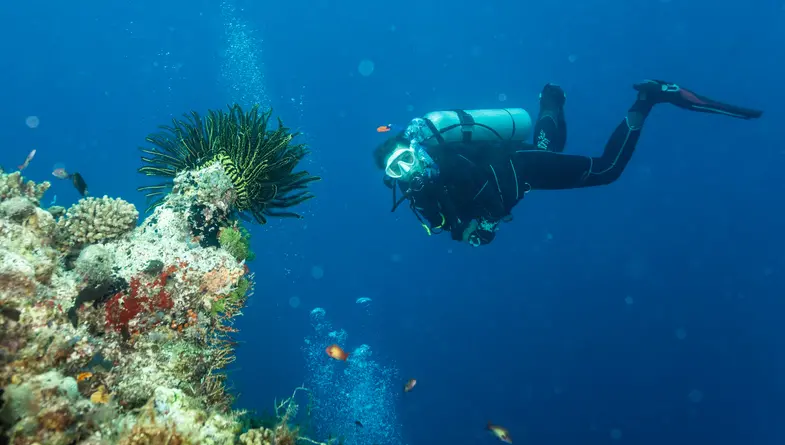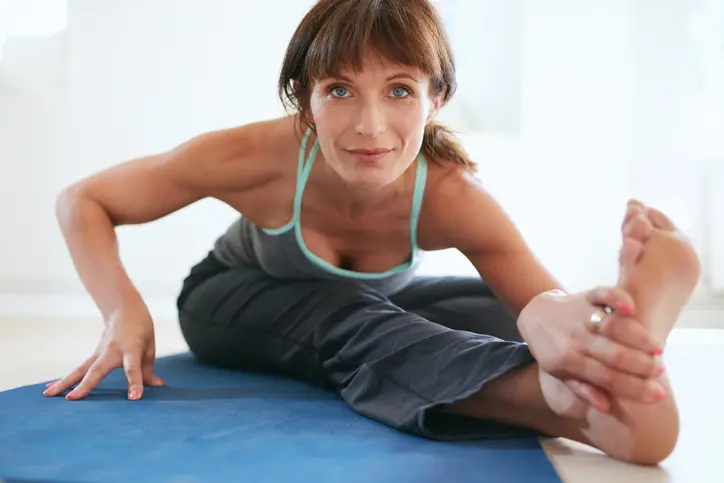Scuba diving demands considerable physical exertion and fitness. Maneuvering through the water and powering against currents requires strength, stamina, and lung capacity, highlighting its intensity as a sport. Whether you are an avid diver or new to the sport as a challenge as we reach our mid-life, we recommend checking out our top tips on how to stay healthy and get fit for scuba diving adventures. Maximize your health and fitness for safe, enjoyable, and smooth dives.

Prioritize Cardiovascular Fitness
Strong cardiovascular health ensures you can swim against currents and handle long distances with ease. Incorporating activities such as swimming, running, or cycling into your training routine can significantly boost your stamina and lung capacity. These exercises mimic the endurance required for scuba diving, preparing your body for the physical demands of the sport.
- Swimming: Regular swimming sessions can vastly improve your overall stamina and lung capacity, crucial for prolonged diving sessions. Aim for at least 30 minutes of continuous swimming, focusing on different strokes to work various muscle groups.
- Running: Running, particularly long-distance running, enhances cardiovascular strength. Aim for at least three to four runs per week, gradually increasing your distance to build endurance.
- Cycling: Cycling is another excellent way to build cardiovascular fitness. Whether on a stationary bike or outdoors, cycling works your legs and core while improving your cardiovascular health.
 Develop Core Strength and Flexibility
Develop Core Strength and Flexibility
A strong core enhances your stability underwater, making it easier to maintain buoyancy and maneuver through the water. Pilates and yoga are excellent for building core strength and improving your flexibility. Enhancing your movement range, particularly in your back and hips, is vital for efficient fin kicks and can help prevent cramps and injuries during dives.
- Pilates: Focus on exercises that strengthen the deep core muscles. Pilates improves not just core strength but also body awareness and control, which are essential for maintaining proper buoyancy and form underwater.
- Yoga: Yoga enhances both strength and flexibility. Poses like plank, boat pose, and warrior sequences build strength, while forward bends, backbends, and twists improve flexibility. Incorporate a daily or weekly yoga routine to see improvements in your diving performance.
Practice Breath Control
Breath control is essential for scuba divers as a means to manage air consumption and stabilize buoyancy. You can apply breathwork techniques learned in yoga, such as diaphragmatic breathing, to calm your mind and reduce air usage. Training yourself to breathe slowly and deeply will ensure more relaxed and longer dives.
- Diaphragmatic Breathing: Practice this technique by lying on your back with one hand on your chest and the other on your abdomen. Inhale deeply through your nose, ensuring your abdomen rises more than your chest. Exhale slowly through pursed lips. This method enhances lung capacity and efficiency.
- Box Breathing: Inhale for four counts, hold your breath for four counts, exhale for four counts, and hold your breath for another four counts. This technique helps in managing stress and improving breath control, crucial for maintaining composure underwater.
 Maintain a Healthy Diet
Maintain a Healthy Diet
Nutrition plays a critical role in your fitness regime. A balanced diet rich in fruits, vegetables, lean proteins, and whole grains will fuel your body for the physical challenge of scuba diving. Staying hydrated is equally important, particularly in the days leading up to a dive to avoid decompression sickness.
- Balanced Meals: Ensure your diet includes a variety of nutrient-dense foods. Include plenty of vegetables and fruits for vitamins and minerals, lean proteins for muscle repair and growth, and whole grains for sustained energy.
- Hydration: Drink plenty of water daily, especially before and after diving sessions. Proper hydration helps maintain optimal body functions and reduces the risk of dehydration-related issues during dives.
Additional Tips to Get Fit for Scuba Diving
- Strength Training: Incorporate weightlifting exercises to build overall strength, focusing on your legs, core, and upper body. Exercises such as squats, deadlifts, and bench presses are excellent for building the necessary muscle mass.
- Regular Diving Practice: Nothing beats the real thing. Regular diving sessions help acclimatize your body to the underwater environment and improve your skills.
- Rest and Recovery: Allow your body adequate time to rest and recover. Overtraining can lead to injuries and fatigue, which are counterproductive to your fitness goals.
Avoid one of the most common mistakes beginner divers make by enhancing your health and fitness with these top tips. Incorporating these scuba diving fitness and health strategies into your lifestyle prepares you for the incredible experience of exploring aquatic environments. Stay fit, maximize your health, and plunge into your next underwater adventure with confidence.


 Develop Core Strength and Flexibility
Develop Core Strength and Flexibility Maintain a Healthy Diet
Maintain a Healthy Diet












